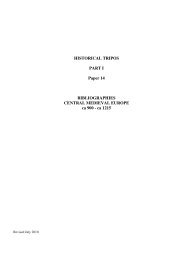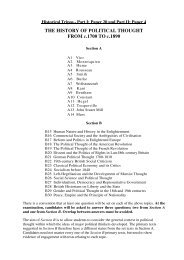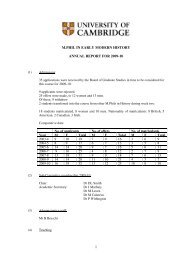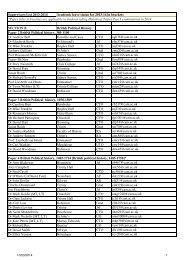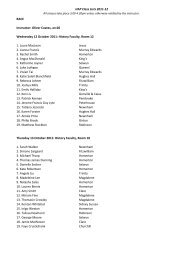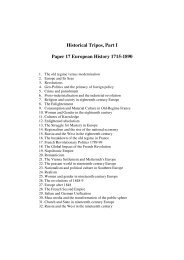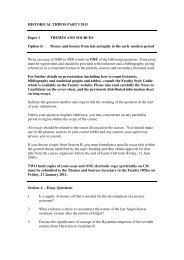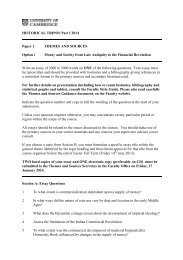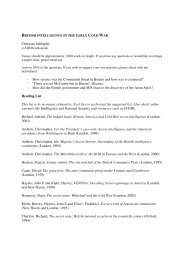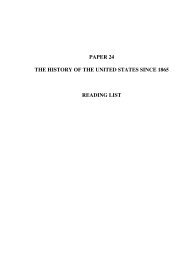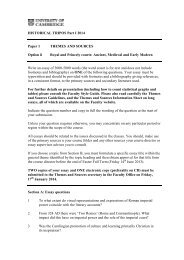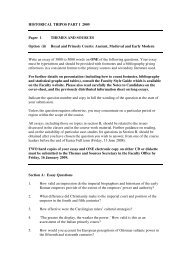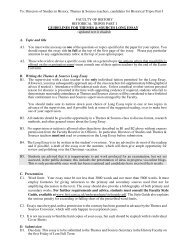Course Handbook - Faculty of History - University of Cambridge
Course Handbook - Faculty of History - University of Cambridge
Course Handbook - Faculty of History - University of Cambridge
You also want an ePaper? Increase the reach of your titles
YUMPU automatically turns print PDFs into web optimized ePapers that Google loves.
must be sought in writing (by letter or e-mail). Any such request must be accompanied by<br />
confirmation that the change has been discussed with and is supported by your supervisor.<br />
While permission to change titles is not automatically granted, it does <strong>of</strong>ten happen that<br />
students need to refine their titles from those initially submitted. This is accepted practice so<br />
long as the correct procedures are followed. The above points refer to minor refinements <strong>of</strong><br />
titles. However, no substantive changes <strong>of</strong> topic area will normally be permitted once<br />
examiners have been appointed by the MPhil Sub-Committee, because examiners are<br />
appointed with expertise relevant to the topic area indicated by the original title submitted<br />
by the student. Students must therefore be sure to identify at least the broad area <strong>of</strong> their<br />
intended dissertation correctly in the original title submission.<br />
Dissertations must be submitted to the <strong>History</strong> <strong>Faculty</strong> Office before 12.30pm on<br />
Friday 19 August.<br />
Dissertations will be assessed by two examiners (excluding the supervisor), one <strong>of</strong> whom<br />
may be an external examiner, who will report independently. Dissertations will be classed<br />
according to a scale comprising Pass (60 and above), Marginal Fail (59) and Fail (58 and<br />
below).<br />
Two marks <strong>of</strong> 67 or above are normally required for a candidate to proceed to a PhD.<br />
59 A borderline mark. As it stands, this mark indicates that the dissertation<br />
fails but that the Pass/Fail qualities are very evenly balanced in the<br />
dissertation.<br />
Please refer to Appendix B ‘MPhil in Economic and Social <strong>History</strong> – Marking and<br />
Examining Scheme’ for a more detailed explanation <strong>of</strong> examining and marking procedures.<br />
2.4 Advanced <strong>Course</strong>s<br />
These courses will be taught using a mixture <strong>of</strong> lectures and seminars amounting to 16 contact hours<br />
over the course <strong>of</strong> Michaelmas and Lent Terms. Some courses are taught solely in one term or the<br />
other, and dates are usually arranged at the first session, except for ‘Institutions and development’,<br />
which has a set schedule.<br />
1) The history <strong>of</strong> economic and social thought<br />
Dr. C. Muldrew, Dr. S. Thompson and Dr. S. Reinert<br />
This course focuses upon six basic themes in the history <strong>of</strong> economic and social thought<br />
through intensive study <strong>of</strong> the writings <strong>of</strong> certain seventeenth, eighteenth- and nineteenthcentury<br />
authors: the nature <strong>of</strong> money and monetary relations (John Locke and John Law);<br />
regulation and laissez-faire (Adam Smith); economic and social reform; the Industrial<br />
Revolution; the state and social change; and the development <strong>of</strong> capitalist modernity and<br />
social theory (Marx, Weber).<br />
Introductory reading:<br />
Malynes, Gerald de, Consuetudo vel Lex Mercatoria, (London, 1622).<br />
McCulloch, J.P., A Select Collection <strong>of</strong> Early English Tracts on Commerce, (<strong>Cambridge</strong>,<br />
1954).<br />
Patrick Hyde Kelly (ed.), Locke on Money, 2 vols., (Oxford, 1991)<br />
John Law, Money and Trade Considered with a Proposal for Supplying the Nation with<br />
Money (Edinburgh, 1705).<br />
Margaret Schabas, The Natural Origins <strong>of</strong> Economics (<strong>University</strong> <strong>of</strong> Chicago Press, 2005).<br />
Jean-Jacques Rousseau, The Basic Political Writings, trans. Donald A. Cress (Hackett,<br />
1987).<br />
Robert C. Tucker, ed., The Marx-Engels Reader, 2nd edition (W. W. Norton, 1978).<br />
9




